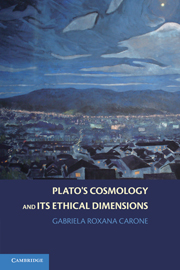Book contents
- Frontmatter
- Contents
- Preface
- Plato's Cosmology and Its Ethical Dimensions
- 1 Introduction
- 2 Demiurgy in the Timaeus
- 3 Cosmic God and Human Reason in the Timaeus
- 4 Creating Mixtures in the Philebus
- 5 Happiness in the Universe of the Philebus
- 6 Reversing the Myth of the Politicus
- 7 Cosmic and Human Drama in the Politicus
- 8 Laws X: First Causes and the Origin of Evil
- 9 Conclusion
- Notes
- Bibliographical References
- Index Locorum
- General Index
9 - Conclusion
Published online by Cambridge University Press: 10 May 2010
- Frontmatter
- Contents
- Preface
- Plato's Cosmology and Its Ethical Dimensions
- 1 Introduction
- 2 Demiurgy in the Timaeus
- 3 Cosmic God and Human Reason in the Timaeus
- 4 Creating Mixtures in the Philebus
- 5 Happiness in the Universe of the Philebus
- 6 Reversing the Myth of the Politicus
- 7 Cosmic and Human Drama in the Politicus
- 8 Laws X: First Causes and the Origin of Evil
- 9 Conclusion
- Notes
- Bibliographical References
- Index Locorum
- General Index
Summary
In this book I have argued that Plato's cosmology is an indispensable framework for understanding his concerns about the happy life in the late dialogues. While the Timaeus and the Philebus emphasise the role of the universe as a model for human behaviour, the Politicus and the Laws, without dismissing the latter dimension, seem to open a new one: the universe as the stage of human actions, whose description can be tinged by anthropological concerns. This can reach the point of depicting on a cosmic scale an ethical drama that seems inherently human, as in the Politicus, or portraying the cosmos as the battlefield of human good and evil in the Laws, with a consequent warning, we might infer, about the cosmic dimension of human behaviour, since whatever we do is reflected in the cosmos and contributes to its being good or not.
The late dialogues, in addition, present the universe as a “common origin” for all souls (Laws X 903d2–3; cf. Tim. 41d, Phil. 30a), which therefore have a kinship not only among themselves but with their source. Hand in hand with this, we see Plato's tendency to extend more widely the possibility of an autonomous kind of happiness, a tendency that seems to rescue him, as it were, from the limitations of his elitist approach in the Republic.
- Type
- Chapter
- Information
- Plato's Cosmology and its Ethical Dimensions , pp. 189 - 196Publisher: Cambridge University PressPrint publication year: 2005



